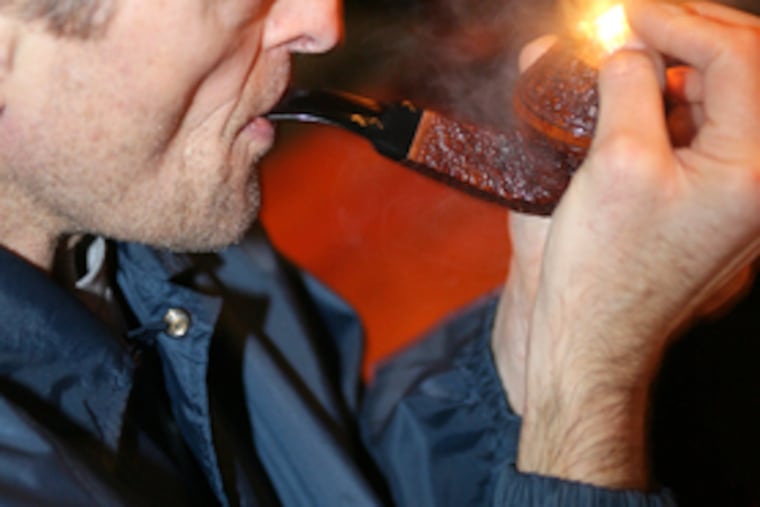Pipe dreams come true at P&P
Smoking just fine at journalists' club

"How did we find this place?" asked Abbie Kinsler, sitting on a barstool at the Pen & Pencil Club on Latimer Street.
By we, she meant the Christopher Morley Pipe Club of Philadelphia, of which she is a member, and which was holding its monthly meeting at the private Center City journalists' club for the second time.
"Some subterfuge," replied Lester Young, who sat at the opposite end of the bar. "Somebody must have known some journalist who told them about this place."
The third Wednesday of every month, a handful of men and women of varying ages and professions come together to share an undying affection for smoking tobacco from pipes.
But it's getting harder to find a place to smoke in Philadelphia. Two bills passed by City Council and signed into law by former Mayor John Street in 2006 prohibit smoking in public places and in the workplace. The Pennsylvania and South Jersey suburbs have passed similar laws.
Just a few months ago, the Morley Club was meeting at Houlihan's on City Avenue in Bala Cynwyd. Before that, at Finnigan's Wake on Spring Garden Street. And before that, at Chris' Jazz Cafe on Sansom Street.
"It perturbs us with all the closing-in of the laws, and how things have tightened up," said Steven Gaschet, an architect and a pipe-club regular. "It was almost desperate, until we found the Pen & Pencil Club."
Bob Page, a former journalist in Illinois and a founder of the pipe club, had pushed for the club to meet at the Pen & Pencil after moving from Houlihan's. Ten members attended the club's last meeting, on Nov. 19.
The pipe club started in the mid-1980s in a guitar store run by Page at Broad and Walnut streets. Back then, the club wasn't officially under the Morley name and the members consisted of just Page and a few others. They met at his store and a few clubs in the area until interest "fizzled out in the late '80s," Page said.
A few years later, Page was walking in Center City and spotted Rabbi Ira Stone of Temple Beth Zion-Beth Israel, 18th and Spruce streets. The rabbi had a pipe in his mouth. Page caught up with Stone and presented the idea of the pipe club, and the group was born anew.
In 1993, they named it the Christopher Morley Pipe Club of Philadelphia, in memory of a Haverford-born columnist for the old Philadelphia Evening Public Ledger, who had a passion for pipes.
Morley is best-known for his 1939 novel Kitty Foyle, in which a young Philadelphia woman falls in love with a wealthy Main Line man, gets pregnant and has an abortion. Ginger Rogers won an Academy Award for best actress in the 1940 movie adaptation.
The smoking ban doesn't stop the men and women of the Morley Club from owning hundreds of expensive pipes and smoking some of the most varied tobacco.
Most novice pipe-smokers buy pipe-and-tobacco sets in drugstores, Young said, while hard-core collectors like himself import the best pipes and tobacco and try them all with the club.
"I have gone crazy with pipes lately," said Young, who owns a consulting firm for automotive and auto-parts companies.
Having given up pipe-smoking in the '60s because he thought his tastes had changed, Young said, he started again 13 months ago when he realized it was the tobacco that had changed. He said he now owns hundreds of pipes, but the taste keeps him coming back.
"Pipe-smokers, unlike cigarette-smokers, do not inhale their smoke," Page said. "They smoke it for the flavor and aroma."
The club occasionally holds pipe-smoking contests, in which the object is to smoke as long as possible without relighting, using just two matches and three grams of tobacco.
Conversations at club meetings can be as varied as members' professions.
"It can get as complex as you want," Gaschet said. "The discussion can go on and on about the various idiosyncrasies and individual views - mostly the individual views - about what's the right way, the wrong way, the best way, whatever. And, of course, there is no best way, right way, wrong way: It's all talk, which is what it's all about."
Members include a surgeon, a cardiologist, an emergency-room doctor, an architect, an insurance salesman, a postal worker, an Italian lecturer from Penn and a construction-project manager.
A doctor from Thomas Jefferson University Hospital wished to remain anonymous because of the criticism he would get from patients if they heard about it.
"I have to tell all my patients to stop smoking," he said. "It'd be a joke."
Jeremy Daross, project manager for a construction company, said some folks react with disgust to smoking because of its negative connotation regarding health.
"People think of smoking as such a negative thing, but pipe smoking is completely different," he said. "It's a connoisseur's art."
Daross, one of the club's newest members, joined in February after meeting a Morley member in an online pipe-smoking forum.
Daross said the club welcomes newcomers. He likes the relaxing atmosphere of what the club and pipe-smoking provide.
"In today's world, everybody's trying to get everything done as fast as possible," he said. "This is the opposite."
The club's next meeting is scheduled for 7 p.m. Dec. 17 at the Pen & Pencil Club.